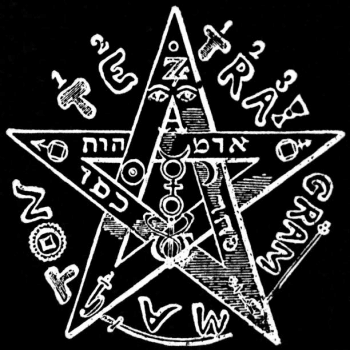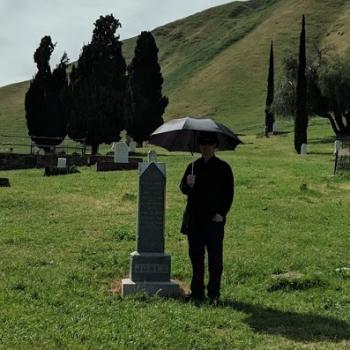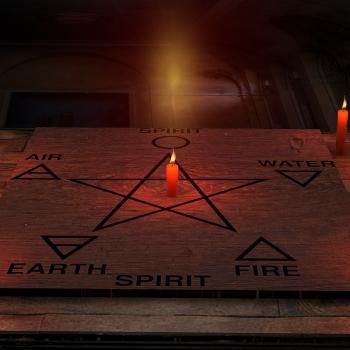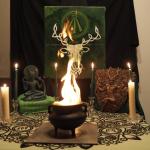I’m going to take a break from my usual exhortations toward steady, committed, daily practice to talk about something that I don’t generally bother with. I want to talk about fiction. Not fiction for its own sake, but what fiction says about the West and about the meaning of magic.

We’re Not the Target Audience
Most fiction isn’t written for us. And by “us” I mean spiritual practitioners of all stripes. From the devout Christian visionary to the third degree Witch to the Master of the Temple, those who have crossed the abyss (by whatever name) and returned are somehow set apart.
With the exception of the occasional documentary that hits just the right note, there’s not much that the writers of the entertainment industry have to say that is of any use.
The grim reality is that we magicky types are, in the words of Hooper from Chasing Amy (1997), “a minority in a minority of the minority” – and nobody’s paying any attention to us. For the most part, that’s no different from other subcultures.
The movies we watch and books we read are a pleasurable distraction written by people who, by and large, do not know much at all beyond the here and now. The stories aren’t for us, but sometimes they are about us.
The Stories Told
For the everyday person, the idea that there might be people with “superpowers” is a ridiculous speculation. Tell them there is a world beyond what they know and they ask, “where is the proof?” But at the same time they carry a lingering doubt, founded on the knowledge that they live in a world they don’t understand. No matter how hard they cling to certainty, a voice whispers inside them what if…?
As people living in the 21st century, and as Westerners in particular, we live in a world of heretofore unimaginable knowledge. Each of us has the opportunity to be so educated that there is no historical comparison. And yet such knowledge does not set us apart – it is knowledge open to all of us.
The everyday, good citizen is prone to flights of fancy, and it is encouraged within a limited context. And there is a certain subset of fiction that is geared for those who wish that magic and superpowers are real. While there are a thousand to choose from, I wanted to examine some of the ideas behind two of my favorites: Harry Potter and the X-Men.

Flight into the Unknown
The worlds of both the Harry Potter and the X-Men franchises focus on small populations set apart from the everyday world. In both of them, some people are born with powers and marked as separate from the common life. In both of these fictional cases, the development of powers is a generally considered a metaphor for coming of age and stepping into the power of adulthood.
For the actual practitioner, such ideas are metaphors. Here in the “real world” the ability to “break the rules” as we commonly accept them is generally unimpressive, though it does hold a certain power. Simply, we magicky types might sense the opportunity for a promotion at work, or the predator lurking, and thus be marginally better off than someone untrained. We might perform magic to find a date, with varying and sometimes hilarious results. We do not, however, learn to literally fly, or shapeshift, or teleport.(1)
That doesn’t mean we don’t have power – power that allows us to reach out from the unknown and turn things to our advantage, ward off our enemies, or whatever else we care to turn our deeper selves to. There is much to be learned, and the greatest lesson is that the universe is more than we ever imagined.
Those who have not made the trip into the unknown imagine us practitioners as not what we become, but petty, everyday people with hidden knowledge and power shoehorned in. It’s a terrifying thought.
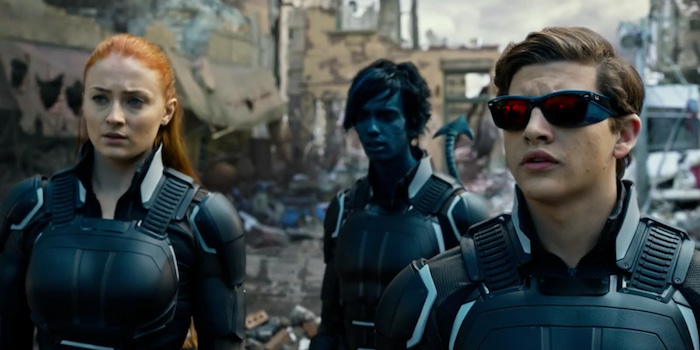
Harry Potter Got Muggles Right
In the magical community, there is something of a love-hate relationship with Harry Potter. I think there are two opposing tensions involved.
On the one hand, the movie has nothing to do with anything resembling real magic. That doesn’t set us apart – I’m pretty sure LEOs know there’s nothing real about cop shows, forensic anthropologists know there’s nothing real about CSI or Bones, and so forth.
On the other hand, we’re thrilled to be the good guys for a change (even if we’re also the bad guys, too). Except that’s not true.
Harry Potter isn’t about us as practitioners. It is about everyday people, given gimmicky magic powers. And while it appeals to us as everyday people, it doesn’t really reflect anything about actual spiritual development. It’s fantasy, just like it’s meant to be.
But that’s not really my point. What is interesting is the world that Rowling created, and how she saw that from the perspective of the muggles(2) there would need to be some sort of regulation around practitioners.
Sure, the books are written from the wizards’ perspective, and the characters might (or might not) look down on the muggles, but the wizards are engaging in their own flight of fancy. If there were a war, the muggles would slaughter the magic types and drive them into hiding or extinction.(3)
The Ministry of Magic, in the Harry Potter world, is there to keep the wizards safe. It helps keep the peace. Because within the world, if there were a war, the muggles would wipe out the wizards in about a week. Even more frightening is the idea of what the wizards might have to do to win.
If Harry Potter is about people carefully trained to be wizards, then the X-Men is about people with such powers thrust upon them. There’s little in the Marvel Universe to recommend being a mutant. It’s pretty much a terrible fate.
And speaking of terrible…
Where X-Men: Apocalypse Went Wrong
No, I’m not going to simply agree with Roger Ebert, who gave X-Men: Apocalypse one out of four stars on its merits. I actually kind of liked the movie. I didn’t think it was good, but for a superhero-franchise movie it did its job.
What I would like to reflect on is the lack of serious worldbuilding. The mutants were so inhuman that I ended up sympathizing with the supposedly cowardly, villainous Major Stryker, a man who believed that the mutants should be controlled or destroyed at any cost.(4)
The villainous Apocalypse ends up killing tens, or even hundreds, of millions of people. Just for starters, he wipes out Cairo, a city of about ten million people. He disrupts the lives of every person in the world. By contrast, the “good guys” (if you include a mind-controlled Wolverine) kill mere dozens.
Sure, Apocalypse loses in the end. It’s a superhero movie. But what frustrated me was the sheer lack of anyone but the X-Men taking action. And I’m not talking about the Avengers. A hundred million dead, and still the silly humans don’t learn.
The Truth about Muggles
The “muggles” of the Marvel Universe take the death of a hundred million people lying down. In this, X-Men: Apocalypse is wrong about the power, and the goodness, of humanity. Perhaps we are supposed to hate and pity Major Stryker as a caricature of the blind fear and hatred. The writers want us to see him as inhuman, someone unable to see the humanity – of those who could snuff him out like a candle. He’s no villain; he’s not inhuman. In fact, he’s all too human.
And there’s something to be learned there. Like I said in the beginning, these movies resonate with the everyday person. We love the idea of a hero with superpowers. We are thrilled by the villain who can break the rules – not just of society, but of the universe.
All this takes place against a backdrop of Western culture. It’s a place few seriously believe that there is any power beyond the physical. On a daily basis, most religious people don’t take the power of their prayers to change the world seriously. Whether it’s prayer or ritual, they believe in “magic” but don’t practice it.
As a result, Westerners have some strange ideas of what magic is. We might think it is rebellion against God and the natural order, or a gift from the gods. But few think of it as simply part what people do.
If we want to understand how most cultures, which accept that magic is real, deal with the dangers it poses, it’s not impossible. We need only to think of how we would feel if those powers rested not in fiction, and now with heroes and villains. Imagine if those with hidden powers were our coworkers, our competitors, or even our spouses. Other cultures have rules about those things, enforced with everything from social approbation to mob action.
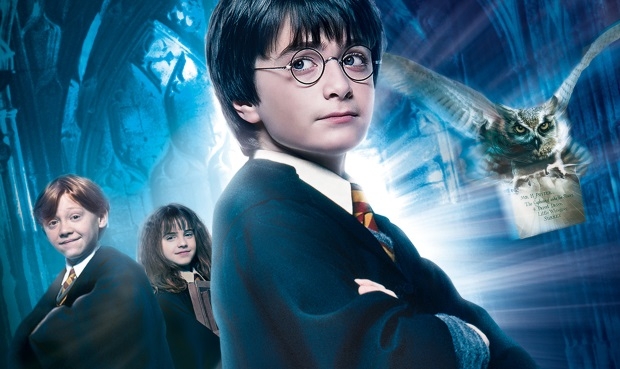
Magic as a Martial Art
I’ve sometimes heard, in magical circles, a disdain for those who do not know. We follow the trend fiction and call them muggles; we shrug at the mundanes who cannot understand. However we set ourselves apart, we fail to understand that it is we who are relying on our common humanity.
I am not suggesting that we need a Ministry of Magic or some such fictional solution to regulate magical practices. Mostly, such activities are self-regulating.
For our own sake, we need to understand and respect the power of the culture we live in. I have yet to meet a practitioner with a thousandth of the mana(5) of a key political or economic player. In short, we can train to make ourselves stronger within out limits, but there are people out there, as mundane as the day is long, with more spiritual power.
There has been a trend in recent years toward treating what we might call (without judgement) “martial” magical practices as if they weren’t a double-edged sword. Taught by fiction, we with a lightness more appropriate to fiction.
In the martial arts, we tell our students not to abuse their newfound powers. We drum into them, “only for self-defense.” Maybe they think we’re protecting those around them, but it is clear to me that we are primarily protecting our students from the repercussions of bad decisions.
If there is a lesson to be learned, if these stories are modern morality plays, then stories about people with superpowers are about how we choose to act responsibly. And they are also stories about the dangers that await us if we fail in our responsibilities.
—–
(1) There are occasional claims to the contrary. I’ve been present at some bona-fide miracles and the beneficiary of at least one. I have spent much of my adult life studying the “impossible.” Such claims can be lumped into the category, “talk is cheap.”
(2) I feel like I can assume that most everyone reading this blog knows what a “muggle” is. Within Harry Potter, the word is a somewhat snide descriptor of those not born with magical abilities, and who are thus considered somewhat clueless about the “real world.” I have hear the term brought, semi-jokingly, into real life.
(3) The division of the muggles from wizards is taken as a given in the Harry Potter books and movies. For a deeper discussion on it, see this article on Wizards, Mundanes, and Economic Benefit.
(4) The Major Stryker of the X-Men comic books is a much less palatable character, who sets himself up as a televangelist, runs an extrajudicial paramilitary organization, and was originally based on Jerry Falwell’s televangelism in the early 80s. I am ignoring all that and focusing on his character in X-Men: Apocalypse.
(5) I am using the term “mana” here to refer to that raw spiritual power that comes from having high social status. The term comes from the Hawaiian language to refer to the spiritual power of people who are leaders. There are advantages to those positions of power that extend far beyond a fat bank account and swooning investors, and anthropologists have long used this term to describe any similar belief system (while not quite admitting their core origin).






